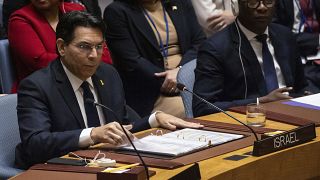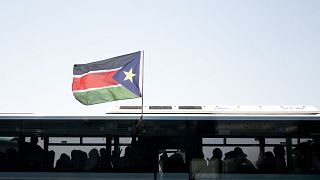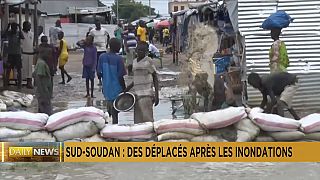South Sudan
Forest rangers patrol the Bangangai game reserve in Western Equatoria, in the southwest corner of South Sudan.
Their task is to stave off poachers and protect the game reserves.
The job is already a challenge, but made all the more difficult amid a lack of resources and an increase in poaching since a fragile peace deal was signed in 2018 to end the country's five-year civil war.
The reduction in fighting has made it easier for people to travel, which has in turn fuelled poaching in the forests outside the protected parks.
A lack of job opportunities is also driving people to kill animals for money, according to locals.
It's a daunting task for the rangers who don't have vehicles or radios when they go out on patrol.
There are roughly 100 rangers and one car to cover five protected areas in Western Equatoria state. Officials say it is not enough.
"The challenges are that we need a vehicle because it would help us in many ways," says ranger captain, Kindosa Ruvango Godfree.
"When we have problems it could facilitate movement into town. With regards to communication, having a radio would be ideal on patrol or to be able to speak to the base. You've seen the type of (dense) forest we have, so if something happens to people on patrol they'll need reinforcements for injury or from an attack."
South Sudan's six national parks and 13 game reserves cover more than 13 percent of the country's terrain.
The country has more than 300 mammal species and boasts one of Africa's greatest annual antelope migrations.
The Bangangai game reserve covers approximately 170 square kilometres and its location on the intersection of Central and East Africa gives it an unique biodiversity.
It is home to animals such as chimpanzees, bongos, the African golden cat, ground and tree pangolins.
However, it's often hard to spot any animals here - there are hardly any left.
During the civil war, the park was inhabited by armed groups making it inaccessible to rangers. Many of the animals were killed or fled.
Today, some 25 forest rangers regularly patrol the reserve, tracking animals and looking for poachers.
But without radios or trucks it's hard for them to communicate and coordinate with one another.
In September, the team captured a poacher from neighbouring Congo but was unable to transport him to police in the main town because they didn't have a car.
The rangers detained the poacher at their post for a month before he escaped, they said.
Fauna and Flora International (FFI) is one of the few organisations in the country helping South Sudan's wildlife ministry to protect its parks.
FFI trains rangers on how to use GPS and camera traps and teaches the community about the importance of protecting wildlife.
Since the organisation started working with rangers and the community in 2018, it says it's seen an increase in the number of animals here.
Focus has now shifted to the edges of the park, where human settlements are encroaching and poachers are proliferating.
"With the security now there is more movement of these nomadic people. Why? Because they are interacting with the community, getting the food from them and sometimes also they're targeting the big animals. Animals like elephants, like lions, like leopards," says Clement Bangunda, program officer for Fauna and Flora International.
"They are destroying the natural river and the animals are running, they are burning the bushes, unnecessarily burning, and this is affecting the environment."
Residents burn swaths of land to clear it for cultivation, which can eventually damage the soil.
The war displaced more than four million people and pushed tens of thousands to the brink of starvation.
It means conserving the parks isn't a governmental priority amid a dire humanitarian crisis, but the group says the parks, rich in biodiversity and natural resources, need to be protected.
"In a place like South Sudan when you're facing so many other emergencies and development needs the importance of saving parks might be considered secondary," says Benoit Morkel, South Sudan country representative for Fauna and Flora International.
"But when you look at the potential that this country has to rely on its natural resources and what natural resources there are, the scale of these protected areas is massive and they truly do hold such incredible biodiversity and potential for generating sustainable incomes through tourism, through a number of income generating streams."
Morkel says protecting the parks is also vital in the fight against climate change.
"If you look at the state of the country and the economy, it's certainly not contributing significantly to climate change and yet is being massively impacted by it. Part of the reason to protect these reserves is to contribute to climate resilience."
***AP***













01:11
Climate crisis takes centre stage at G20 summit in Brazil
01:38
COP29: What next for Africa's energy transition?
01:26
Zimbabwe’s Climate-Smart Agriculture: Empowering Farmers through Resilience and Innovation
01:14
Delegates express cautious optimism on second day of climate summit
01:35
COP29: What do African youth expect from the climate summit?
01:12
COP29 in Baku: High stakes and a $1 trillion question for climate finance